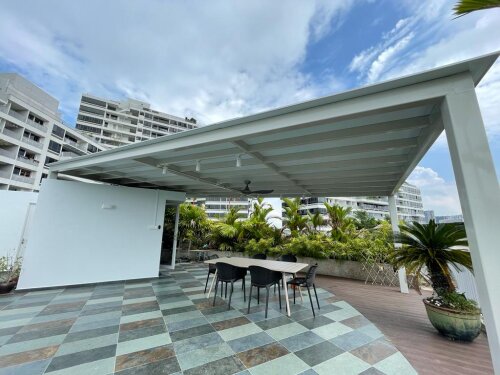Best Renewable & Alternative Energy Lawyers in Singapore
Share your needs with us, get contacted by law firms.
Free. Takes 2 min.
Or refine your search by selecting a city:
List of the best lawyers in Singapore
About Renewable & Alternative Energy Law in Singapore
Singapore is making significant investments and policy changes to transition toward a greener and more sustainable energy landscape. Renewable and alternative energy refer to sources such as solar, wind, bioenergy, and waste-to-energy technologies that offer alternatives to traditional fossil fuels. The Singapore government has outlined clear strategies under the Singapore Green Plan 2030 to support the adoption of renewable energy, reduce greenhouse gas emissions, and promote energy efficiency. Legal frameworks are set in place to regulate energy production, grid access, licensing, environmental compliance, and financing in this dynamic sector.
Why You May Need a Lawyer
Navigating the legal landscape of renewable and alternative energy in Singapore can be complex. Here are some common situations where legal guidance may be essential:
- Starting a renewable energy business and obtaining the required permits
- Negotiating contracts for the sale, purchase, or distribution of renewable energy
- Dealing with land acquisition or leasing issues for energy projects
- Understanding tax incentives or grants for green energy investments
- Addressing regulatory compliance with environmental standards
- Managing joint ventures, partnerships, or foreign investments in energy sectors
- Handling disputes involving service contracts or intellectual property (such as patents for green technologies)
- Advising on carbon credits, emissions trading, and related financial instruments
- Supporting mergers, acquisitions, and due diligence for energy projects
Local Laws Overview
Singapore does not have a single law dedicated to renewable energy. Instead, various legislation and regulatory frameworks govern the sector, including:
- Energy Market Authority of Singapore Act - Establishes the Energy Market Authority (EMA), which regulates electricity and gas industries.
- Electricity Act - Regulates the electricity sector including licensing for generation, retail, and transmission activities.
- Renewable Energy Certificates (REC) Framework - Facilitates certification and trading of green energy generation.
- Building and Construction Authority (BCA) Green Mark Scheme - Encourages sustainable building through incentives and certification.
- Carbon Pricing Act - Introduces a carbon tax to encourage carbon emissions reduction across industries including energy.
- Environmental Protection and Management Act - Governs standards for pollution control affecting energy projects.
- Land Use Regulation - Controls allocation and approval of land for energy infrastructure projects.
Local policies also prioritize the use of solar power and the development of innovative solutions for floating solar panels, battery storage, and energy efficiency. Importantly, cross-border electricity imports and trading are emerging as strategic opportunities in the energy mix.
Frequently Asked Questions
What types of renewable energy are most common in Singapore?
Solar energy is the most widely adopted renewable energy source in Singapore due to abundant sunlight and limited land space, which supports rooftop and floating solar installations. There is also development in waste-to-energy and research into other alternatives, but wind energy is limited by the country's low wind speeds.
Do I need a license to produce renewable energy for commercial use?
Yes, entities that generate, import, or retail electricity in Singapore, including from renewable sources, must obtain the appropriate licenses from the Energy Market Authority (EMA).
Are there government incentives for renewable energy projects?
Yes, the government offers grants and incentives such as tax benefits, funding programs, and certification through schemes like the SolarNova Program and the Green Mark Scheme to encourage green technology adoption.
What regulations control the installation of solar panels?
Building owners must comply with regulations from the Urban Redevelopment Authority (URA), Building and Construction Authority (BCA), EMA, and the Singapore Civil Defence Force (SCDF) when installing solar panels. Approvals may be required for structural modifications, electrical safety, and fire safety.
How are carbon credits and emissions trading regulated?
The Carbon Pricing Act sets the regulatory framework for carbon tax, monitoring, and reporting. Greenhouse gas emitters must register and comply with the requirements for carbon credits and may participate in voluntary emissions trading schemes.
Can private individuals install renewable energy systems at home?
Yes, homeowners can install solar panels or other renewable energy systems subject to compliance with building codes and obtaining necessary approvals from relevant authorities.
What are the legal considerations for joint ventures in renewable energy?
Joint ventures must consider shareholding structures, intellectual property contribution, contract terms, regulatory licence equity thresholds, and due diligence compliance in both local and cross-border contexts.
Is it possible to export renewable energy to neighboring countries?
The Singapore government is piloting electricity imports under the Laos-Thailand-Malaysia-Singapore Power Integration Project and seeking new cross-border cooperation. Exporters must comply with EMA requirements and negotiate Power Purchase Agreements.
How is intellectual property protected in green technology projects?
Innovators can file patents, trademarks, and design registrations with the Intellectual Property Office of Singapore (IPOS) to protect new technologies and processes used in renewable energy projects.
What happens if a renewable energy project causes environmental harm?
Projects must comply with the Environmental Protection and Management Act. Non-compliance or causing environmental harm can lead to investigations, fines, suspension of operations, or criminal liability depending on the severity of the breach.
Additional Resources
If you are seeking more information or guidance, reach out to the following organizations and resources:
- Energy Market Authority (EMA)
- Building and Construction Authority (BCA)
- Singapore Economic Development Board (EDB) - CleanTech and Energy sectors
- Ministry of Sustainability and the Environment (MSE)
- Urban Redevelopment Authority (URA)
- Singapore Green Building Council (SGBC)
- National Environment Agency (NEA)
- Intellectual Property Office of Singapore (IPOS)
- Sustainable Energy Association of Singapore (SEAS)
Next Steps
If you need legal assistance regarding renewable or alternative energy in Singapore, consider the following steps:
- Outline your project, business, or legal concern in detail.
- Gather any relevant documents such as contracts, approval letters, or technical specifications.
- Contact a qualified law firm or lawyer specialized in energy, environmental, and commercial law.
- Schedule a consultation to discuss your needs and receive tailored legal advice.
- Regularly check updates to Singapore’s evolving energy policies and regulations, as legal requirements may change over time.
A legal professional can help you navigate complex compliance issues, secure the appropriate permits, and safeguard your business interests in the growing renewable and alternative energy sector.
Lawzana helps you find the best lawyers and law firms in Singapore through a curated and pre-screened list of qualified legal professionals. Our platform offers rankings and detailed profiles of attorneys and law firms, allowing you to compare based on practice areas, including Renewable & Alternative Energy, experience, and client feedback.
Each profile includes a description of the firm's areas of practice, client reviews, team members and partners, year of establishment, spoken languages, office locations, contact information, social media presence, and any published articles or resources. Most firms on our platform speak English and are experienced in both local and international legal matters.
Get a quote from top-rated law firms in Singapore — quickly, securely, and without unnecessary hassle.
Disclaimer:
The information provided on this page is for general informational purposes only and does not constitute legal advice. While we strive to ensure the accuracy and relevance of the content, legal information may change over time, and interpretations of the law can vary. You should always consult with a qualified legal professional for advice specific to your situation.
We disclaim all liability for actions taken or not taken based on the content of this page. If you believe any information is incorrect or outdated, please contact us, and we will review and update it where appropriate.
Browse renewable & alternative energy law firms by city in Singapore
Refine your search by selecting a city.











